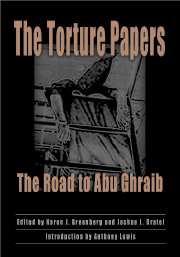From Fear to Torture
Published online by Cambridge University Press: 05 June 2012
Summary
The word torture, long an outcast from the discourse of democracy, is now in frequent usage. Alongside the word, the practice of torture is now in place as well. The coercive techniques that have been discovered at Abu Ghraib and Guantánamo resulted from advice given by leading figures at the Department of Justice, the Department of Defense, and the White House. The policy came about as the result of a series of memos in which the Administration asked for – and was granted – the right to interrogate prisoners with techniques possibly outlawed by the Geneva Conventions and by American military and civil law. The authors of the memos then justified the interrogation techniques on the grounds that in these specific cases, the legal restrictions did not apply. The result is a carefully constructed anticipation of objections at the domestic and international levels and a legal justification based on considerations of failed states, non-state actors, and the national security agenda of the United States.
This volume contains the documentary record of the Bush Administration's path to the coercive interrogation of prisoners held on the suspicion of terrorist activity. Many of the documents included here were brought initially to public attention through the investigative work of reporters at The Washington Post and Newsweek as well as at the American Civil Liberties Union. Through the publication of these documents, we can now reconstruct the chronological, legal, and political story of how a traditionally banned form of interrogation became policy.
- Type
- Chapter
- Information
- The Torture PapersThe Road to Abu Ghraib, pp. xvii - xxPublisher: Cambridge University PressPrint publication year: 2005
- 2
- Cited by



